What Are the Benefits of Fish Oil? Key Advantages Explained
Fish oil has emerged as one of the most researched and widely recommended dietary supplements, derived from fatty fish like salmon, mackerel, and sardines. This concentrated source of omega-3 fatty acids offers documented health benefits that extend far beyond basic nutrition.
Research shows that fish oil supports heart health, reduces inflammation, and may improve brain function through its high concentrations of EPA and DHA omega-3 fatty acids. These essential fats play crucial roles in cardiovascular function, joint health, cognitive performance, and visual development.
Understanding the specific benefits and proper usage of fish oil can help individuals make informed decisions about incorporating this supplement into their wellness routine. From heart disease prevention to mental health support, the science behind fish oil reveals why millions of people worldwide choose this supplement daily.
Key Takeaways
- Fish oil provides essential omega-3 fatty acids that support heart health and reduce cardiovascular disease risk
- The anti-inflammatory properties of fish oil help manage joint pain and support brain function
- Proper dosage and quality considerations are important for maximizing benefits while avoiding potential side effects
Understanding Fish Oil and Omega-3 Fatty Acids

Fish oil contains concentrated omega-3 fatty acids that the human body cannot produce on its own. The two primary omega-3s in fish oil are EPA and DHA, which come from fatty fish like salmon and mackerel.
What Is Fish Oil?
Fish oil is extracted from oily fish like herring, tuna, anchovies, and mackerel. It serves as a concentrated source of omega-3 fatty acids that people can obtain through supplements or direct consumption of fatty fish.
About 30% of fish oil consists of omega-3s, with the remainder containing vitamins A and D. The oil appears as a golden-yellow liquid that manufacturers process into softgel capsules or liquid supplements.
Fish oil supplements come in several forms, including:
- Triglycerides – Natural form found in fish
- Ethyl esters – Concentrated but less absorbed
- Reformed triglycerides – Re-esterified form
- Phospholipids – Found in krill oil
The body absorbs triglyceride and phospholipid forms more effectively than ethyl esters. High-quality fish oil supplements undergo molecular distillation to remove contaminants like mercury and PCBs.
Sources of Fish Oil and Omega-3s
Fatty fish provide the richest sources of EPA and DHA. Cold-water fish accumulate higher concentrations of omega-3s in their tissues.
Primary fish sources include:
- Salmon – Contains 1,500-2,000mg omega-3s per 3.5oz serving
- Sardines – Provide 1,400mg per 3.5oz serving
- Mackerel – Offers 2,300mg per 3.5oz serving
- Anchovies – Supply 1,400mg per 3.5oz serving
- Tuna – Contains 300-1,000mg depending on type
- Pollock – Provides 400mg per 3.5oz serving
Shellfish like mussels, oysters and crabs also contain omega-3s but in lower concentrations than fatty fish.
Fish oil supplements offer an alternative for people who don’t consume adequate fatty fish. Commercial fish oil typically comes from anchovies, sardines, and mackerel due to their high omega-3 content and sustainable harvesting.
EPA and DHA Explained
The two main omega-3s in fish oil are eicosapentaenoic acid (EPA) and docosahexaenoic acid (DHA). These long-chain fatty acids serve different functions in human health.
EPA (Eicosapentaenoic Acid):
- Contains 20 carbon atoms with 5 double bonds
- Primarily supports cardiovascular and inflammatory responses
- Converts to signaling molecules that regulate inflammation
DHA (Docosahexaenoic Acid):
- Contains 22 carbon atoms with 6 double bonds
- Major structural component of the brain
- Essential for eye health and neural development
Fish oil provides better health benefits than plant-based omega-3 sources. Plant sources mainly contain alpha-linolenic acid (ALA), which the body must convert to EPA and DHA through an inefficient process.
The conversion rate from ALA to EPA ranges from 0.2-21%, while ALA to DHA conversion remains below 9% in healthy adults. This makes direct consumption of EPA and DHA through fish oil more effective for meeting omega-3 requirements.
Cardiovascular and Heart Health Benefits

Fish oil provides significant cardiovascular protection through multiple mechanisms, including triglyceride reduction, improved blood pressure control, and decreased risk of major cardiac events. Research demonstrates that omega-3 fatty acids in fish oil can reduce cardiovascular disease risk and improve outcomes for patients with existing heart conditions.
Lowering Triglycerides
Fish oil demonstrates proven efficacy in reducing triglyceride levels, one of its most well-established cardiovascular benefits. The omega-3 fatty acids EPA and DHA work by decreasing VLDL and triglyceride production through reduced liver synthesis.
Clinical dosing typically requires 2-4 grams daily for meaningful triglyceride reduction. Prescription fish oil formulations often contain higher concentrations than over-the-counter supplements.
Studies show triglyceride reductions of 20-50% in patients with elevated levels. This benefit proves particularly valuable for individuals with metabolic syndrome or diabetes who commonly experience high triglycerides.
Fish oil also reduces remnant lipoproteins that can contribute to coronary artery disease. These particles enhance inflammatory responses in blood vessels and increase cardiovascular risk beyond standard cholesterol markers.
Reducing Risk of Heart Disease and Stroke
Research indicates fish oil supplementation may lower the incidence of major cardiovascular events. Studies demonstrate potential benefits for patients with coronary heart disease, though results vary across different populations.
Anti-inflammatory effects play a key role in cardiovascular protection. Omega-3s reduce inflammatory markers like C-reactive protein and tumor necrosis factor that contribute to atherosclerosis progression.
Fish oil provides anti-thrombotic benefits by inhibiting platelet aggregation and reducing blood clot formation. This mechanism helps prevent both heart attacks and ischemic strokes.
The supplements may also help prevent arrhythmias and atrial fibrillation by stabilizing heart rhythm. However, routine supplementation is not universally recommended for primary prevention in all individuals.
Blood Pressure and Cholesterol Support
Fish oil provides modest blood pressure reductions, particularly beneficial for patients with hypertension. The omega-3 fatty acids improve endothelial function and reduce vascular inflammation that contributes to elevated blood pressure.
Systolic and diastolic pressure both show improvement with regular supplementation. Studies in children with metabolic syndrome demonstrated significant blood pressure reductions after one month of omega-3 therapy.
The supplements enhance nitric oxide production and improve blood vessel flexibility. This mechanism helps reduce arterial stiffness and supports healthy circulation throughout the cardiovascular system.
While fish oil primarily targets triglycerides rather than cholesterol, it may provide modest improvements in HDL levels. The American Heart Association recommends focusing on dietary fish intake rather than supplements for most cardiovascular benefits.
Anti-Inflammatory Effects and Joint Health
Fish oil’s omega-3 fatty acids EPA and DHA directly target inflammatory pathways in the body, offering significant benefits for people with arthritis and chronic joint conditions. These compounds work by reducing pro-inflammatory markers and supporting cartilage health at the cellular level.
Reducing Inflammation
Omega-3 fatty acids in fish oil actively combat inflammation through multiple biological mechanisms. EPA and DHA alter cell membrane composition, which reduces the production of inflammatory compounds like prostaglandins and leukotrienes.
Research shows that omega-3 fatty acids can significantly help reduce inflammation in the joints, alleviating pain and stiffness common in arthritis. The fatty acids work by blocking key inflammatory pathways including nuclear factor kappa B (NF-κB) and various cytokines.
Key anti-inflammatory mechanisms include:
- Inhibiting pro-inflammatory cytokine production
- Reducing matrix metalloproteinase activity
- Promoting specialized pro-resolving mediators
- Modulating immune cell responses
Studies demonstrate that people who maintain higher omega-3 blood levels experience less joint inflammation. The omega-6 to omega-3 ratio also plays a crucial role, with lower ratios showing better anti-inflammatory effects.
Managing Arthritis and Joint Pain
Fish oil supplementation provides measurable benefits for both rheumatoid arthritis and osteoarthritis patients. Clinical studies show that omega-3 fatty acids may help reduce joint pain and stiffness associated with these conditions.
For rheumatoid arthritis, fish oil helps reduce morning stiffness and joint tenderness. Some patients experience benefits comparable to low-dose NSAIDs, though without the gastrointestinal side effects.
Typical dosing for joint health:
- EPA: 1,000-2,000mg daily
- DHA: 500-1,000mg daily
- Duration: 8-12 weeks for noticeable effects
In osteoarthritis, omega-3 fatty acids protect against cartilage degradation and reduce inflammatory markers in synovial fluid. The compounds help maintain joint function by supporting cartilage synthesis and reducing breakdown.
Fish oil works best as part of comprehensive joint health management rather than a standalone treatment. Patients often report reduced reliance on NSAIDs when consistently using omega-3 supplements.
Cognitive and Mental Health Advantages
Fish oil provides omega-3 fatty acids EPA and DHA that are critical for normal brain function throughout all life stages. Research shows particular benefits for individuals experiencing mild cognitive decline and depression, though effects vary based on the severity of conditions.
Supporting Brain Function and Cognitive Decline
EPA and DHA omega-3 fatty acids maintain brain cell membrane health and facilitate communication between neurons. These compounds are abundant in brain tissue and play essential roles in cognitive processes.
Studies indicate that fish oil supplements may improve brain function in people with mild cognitive impairment but show limited effectiveness for more severe conditions. One clinical trial found that 900 mg of DHA daily for 24 weeks improved memory and learning performance in older adults with age-related cognitive decline.
Key findings for cognitive conditions:
- Mild Cognitive Impairment: 1.8 grams of omega-3s daily showed improvements after 24 weeks
- Alzheimer’s Disease: Research found no compelling evidence of benefit
- Healthy Individuals: Multiple studies showed no cognitive improvements in people without memory problems
The timing of supplementation appears crucial. Fish oil may be most beneficial when started during early stages of brain function decline rather than after significant deterioration occurs.
Depression, Anxiety, and ADHD
Fish oil demonstrates promising effects for various mental health conditions, particularly depression. Clinical research shows that omega-3 supplements improved depressive symptoms with effects comparable to antidepressant medications.
The most significant improvements occur when fish oil contains higher EPA concentrations. Supplements with elevated EPA levels show greater effectiveness for depression treatment, especially when combined with traditional antidepressant therapy.
Mental health applications:
- Depression: Greatest benefits with high-EPA formulations alongside medication
- Anxiety: Emerging evidence suggests potential benefits
- ADHD: Limited research available, more studies needed
- Bipolar Disorder: Preliminary evidence shows promise
The mechanisms behind these effects remain under investigation. Researchers propose that omega-3s may influence serotonin receptors in the brain or provide anti-inflammatory effects that improve mental health symptoms.
For depression management, experts recommend choosing fish oil supplements with higher amounts of EPA rather than DHA-dominant formulations.
Vision and Eye Health
Fish oil provides essential omega-3 fatty acids that support retinal function and may help reduce the risk of age-related eye conditions. The DHA and EPA found in fish oil concentrate heavily in eye tissues and contribute to proper visual development.
Protecting Eye Health and Retina
DHA concentrates heavily in retinal tissues, making up approximately 60% of the fatty acids in photoreceptor cells. This omega-3 fatty acid supports the structural integrity of cell membranes in the retina.
Fish oil supports healthy tear production, which helps maintain proper eye lubrication. Adequate tear production prevents dry eye symptoms like burning, stinging, and blurred vision.
The anti-inflammatory properties of omega-3s help reduce inflammation around the eye tissues. This inflammation reduction supports overall eye health and may prevent damage to delicate retinal structures.
Marine-sourced omega-3 supplements typically provide more DHA than plant-based alternatives. DHA is the form most concentrated in eye tissues, making fish oil particularly beneficial for retinal function.
Fish oil also improves blood flow and nutrient delivery to retinal tissues. Better circulation ensures adequate oxygenation and waste removal from the eye.
Reducing Risk of Macular Degeneration and Vision Loss
Age-related macular degeneration (AMD) affects the central portion of the retina called the macula. This condition can lead to significant vision loss, particularly in central vision areas.
Research indicates that fish oil may help prevent macular degeneration through its anti-inflammatory effects. Studies show fish oil may prevent macular degeneration by reducing oxidative stress in retinal tissues.
The omega-3 fatty acids in fish oil help maintain the health of blood vessels in the eye. Healthy retinal blood vessels are crucial for preventing the development of wet AMD, which involves abnormal blood vessel growth.
DHA specifically supports photoreceptor cell function in the macula region. These cells are responsible for sharp, detailed central vision that people use for reading and recognizing faces.
Regular consumption of omega-3s through fish or supplements may slow the progression of early-stage AMD. However, individuals should consult with eye care professionals before using fish oil specifically for AMD prevention.
Additional Benefits of Fish Oil
Fish oil provides therapeutic effects for liver conditions like NAFLD, supports fetal brain development during pregnancy, strengthens bones while potentially preserving muscle mass, and treats various inflammatory skin disorders including psoriasis and eczema.
Liver Health and NAFLD
Fish oil supplements show promise in reducing liver fat accumulation, particularly in non-alcoholic fatty liver disease (NAFLD). The omega-3 fatty acids EPA and DHA help decrease hepatic triglyceride levels and reduce inflammation in liver tissue.
Research indicates that fish oil may reduce liver fat by improving the liver’s ability to process fats more efficiently. This is significant since the liver processes most fats in the body and plays a crucial role in metabolic health.
Studies suggest omega-3 supplementation can reduce liver enzyme levels and improve insulin sensitivity in NAFLD patients. The anti-inflammatory properties of fish oil may also help prevent progression from simple fatty liver to more severe forms of liver disease.
However, optimal dosing and treatment duration for NAFLD remain under investigation. Most studies use doses ranging from 1-4 grams of combined EPA and DHA daily for 8-24 weeks to see measurable improvements in liver fat content.
Pregnancy and Development
Fish oil supplementation during pregnancy supports fetal brain and eye development through adequate DHA supply. Taking fish oil supplements while pregnant may help improve cognitive development in children, though more research is needed for definitive conclusions.
DHA comprises approximately 40% of polyunsaturated fatty acids in the brain and 60% in the retina. Adequate maternal intake ensures proper neural tissue formation during critical developmental periods.
Key developmental benefits include:
- Enhanced visual acuity in infants
- Improved cognitive function scores
- Reduced risk of allergies in children
- Better attention spans and learning capacity
Pregnant women should consume 200-300mg of DHA daily through fish or supplements. Fish oil supplements during pregnancy and nursing may improve infant visual development and reduce allergy risk.
Safety considerations include choosing mercury-free supplements and consulting healthcare providers about appropriate dosing during pregnancy and breastfeeding.
Bone and Muscle Support
Fish oil may enhance bone mineral density and reduce fracture risk, particularly in older adults. The anti-inflammatory effects of omega-3s help maintain bone formation while reducing bone resorption processes.
Some studies suggest omega-3 fatty acids can be beneficial for bone health, though calcium and vitamin D remain the primary nutrients for skeletal strength. The relationship between fish oil and bone mineral density appears complex and may depend on supplement quality and individual factors.
Research shows mixed results regarding fracture prevention. Some studies indicate reduced hip fracture rates in elderly populations taking fish oil, while others show minimal effects on overall bone density.
For muscle support, omega-3s may help preserve muscle mass during aging by reducing inflammation that contributes to muscle protein breakdown. This effect becomes particularly important for maintaining mobility and strength in older adults.
The optimal dosing for bone and muscle benefits typically ranges from 1-2 grams of combined EPA and DHA daily, though individual needs may vary based on age and health status.
Skin Health and Disorders
Fish oil effectively treats inflammatory skin conditions through its anti-inflammatory omega-3 content. Fish oil supplements may be beneficial for skin disorders including psoriasis and dermatitis, providing relief from symptoms like redness, scaling, and itching.
The skin contains significant amounts of omega-3 fatty acids, making adequate intake essential for maintaining skin barrier function and healing processes. DHA and EPA help regulate inflammatory responses that contribute to various skin problems.
Skin conditions that may benefit from fish oil:
- Psoriasis: Reduces plaque formation and scaling
- Eczema/Dermatitis: Decreases inflammation and itching
- Wound healing: Supports tissue repair processes
- Dry skin: Improves moisture retention and barrier function
Some research suggests fish oil may offer protective effects against skin cancer by reducing UV-induced inflammation, though this requires further investigation. The aging process also benefits from omega-3s through improved skin elasticity and reduced oxidative damage.
Topical fish oil applications show promise for localized treatment, while oral supplementation provides systemic anti-inflammatory effects. Most skin benefits appear with doses of 1-3 grams of combined EPA and DHA daily over 8-12 weeks.
Supplementation Considerations and Safety
Fish oil supplements require careful consideration regarding quality, dosage, and potential interactions. Understanding proper selection criteria, appropriate intake levels, and possible adverse effects helps ensure safe and effective supplementation.
Choosing Fish Oil Supplements
Quality varies significantly among fish oil supplements available in the market. Look for products that specify EPA and DHA content rather than total fish oil amounts on the label.
Third-party testing for purity ensures the supplement is free from heavy metals, PCBs, and other contaminants. Reputable manufacturers provide certificates of analysis showing contaminant levels.
Key quality indicators include:
- Molecular distillation or purification methods
- Enteric-coated capsules to reduce fishy aftertaste
- Dark bottles to prevent oxidation
- Refrigeration requirements clearly stated
Fresh fish oil should have minimal fishy odor. Rancid oil smells strongly of fish and may cause nausea or digestive upset.
Omega-3 supplements come in different forms including triglycerides, ethyl esters, and phospholipids. Triglyceride forms typically offer better absorption rates than ethyl ester forms.
Recommended Dosage and Purity
General daily intake recommendations for healthy adults suggest 250-500 mg of combined EPA and DHA. Higher doses may be beneficial for specific conditions but should be discussed with healthcare providers.
The National Institutes of Health recommends up to 3 grams daily from supplements without medical supervision. Higher doses for triglyceride reduction may require 4 grams daily under medical guidance.
Dosage considerations by condition:
- Heart health: 1-2 grams EPA/DHA daily
- High triglycerides: 2-4 grams daily
- Rheumatoid arthritis: 2.6-7.1 grams daily
- Depression: 1-2 grams EPA daily
Purity standards should meet or exceed international guidelines. Look for supplements with less than 0.1 ppm mercury and minimal peroxide values indicating freshness.
Capsules should be stored properly to maintain potency and prevent oxidation.
Possible Side Effects and Drug Interactions
Common side effects of fish oil include fishy burps, nausea, and digestive issues. Taking supplements with meals or choosing enteric-coated capsules reduces these problems.
Digestive issues affect approximately 10-15% of users, particularly with higher doses. Symptoms include heartburn, loose stools, and stomach upset.
Some individuals experience headache or dizziness when starting supplementation. These effects typically diminish with continued use or dose reduction.
Serious drug interactions occur with:
- Blood thinners (warfarin, aspirin)
- Blood pressure medications
- Diabetes medications
Fish oil can increase bleeding risk when combined with anticoagulant medications. Patients taking blood thinners should consult healthcare providers before starting omega-3 supplements.
High doses may affect blood sugar levels in diabetics. Regular monitoring becomes important when combining fish oil with diabetes medications.
Individuals with fish or shellfish allergies should choose molecularly distilled products or plant-based omega-3 alternatives to avoid allergic reactions.
Frequently Asked Questions
Fish oil supplementation affects multiple body systems through its omega-3 fatty acid content. These questions address specific health outcomes and safety considerations that researchers have studied extensively.
What are the positive effects of fish oil on heart health?
Fish oil may support heart health through several mechanisms. Research shows it can lower triglycerides, reduce blood pressure, and help prevent arterial plaque formation.
People who consume adequate fish oil often experience improved cholesterol profiles. The omega-3 fatty acids EPA and DHA work to reduce inflammation in blood vessels.
Studies indicate moderate evidence that omega-3 may help reduce the severity of and mortality from heart disease. However, more research is needed to determine its role in stroke prevention.
The American Dietary Guidelines recommend at least 8 ounces of seafood per week for a 2,000-calorie diet. This amount provides sufficient omega-3s for cardiovascular benefits.
Can fish oil supplementation improve skin health and conditions?
The skin contains significant amounts of omega-3 fatty acids as the body’s largest organ. Fish oil supplements may be beneficial in a number of skin disorders, including psoriasis and dermatitis.
Omega-3s help maintain skin barrier function and reduce inflammation. This anti-inflammatory action can improve symptoms in various skin conditions.
Fish oil supplementation may help regulate oil production and support skin healing processes. The EPA and DHA content specifically targets inflammatory pathways in skin tissue.
How does fish oil contribute to hair growth and strength?
Fish oil provides essential fatty acids that support hair follicle health and function. Omega-3s help reduce inflammation around hair follicles, which can improve growth conditions.
The anti-inflammatory properties of EPA and DHA may help address scalp conditions that interfere with hair growth. These fatty acids also support circulation to the scalp.
Fish oil supplementation can improve hair texture and reduce brittleness. The nutrients help strengthen hair shafts and may reduce excessive hair loss related to inflammation.
What are the potential side effects or risks associated with consuming fish oil?
Fish oil supplements can cause side effects diarrhoea, nausea, and allergic reactions in some people. Common mild effects include fishy aftertaste, bad breath, and digestive issues.
Getting too much fish oil can increase your risk of bleeding and might affect your immune response. This is particularly important for people taking blood-thinning medications.
People with seafood allergies should avoid fish oil supplements entirely. Those taking hormonal medications or birth control pills should consult healthcare providers before starting supplementation.
Proper dosage and storage are essential for safety and effectiveness. Rancid fish oil can cause additional side effects and should never be consumed.
In what ways can fish oil impact cognitive function and brain health?
The brain contains about 20% polyunsaturated fatty acids, which include omega-3. These fatty acids are essential for normal brain function and development.
Research suggests people with certain mental health conditions have lower omega-3 blood levels. Having more omega-3s may help prevent the onset or improve the symptoms of some mental health conditions like depression.
Fish oil supplementation may improve memory and cognitive performance in older adults. According to a 2023 meta-analysis of 48 studies, omega-3 supplements may help reduce of dementia and age-related cognitive decline by as much as 20%.
In children, fish oil supplements may improve perceived hyperactivity, inattention, impulsiveness, and aggression. This may benefit early life learning, though more research is needed.
Does fish oil provide any specific benefits for joint health and mobility?
Fish oil’s anti-inflammatory properties directly benefit joint health and function. Fish oil supplements can help reduce joint pain, stiffness, and medication needs in people with rheumatoid arthritis.
The EPA and DHA in fish oil target inflammatory pathways that contribute to joint deterioration. Regular supplementation may slow cartilage breakdown and reduce inflammatory markers.
Fish oil can improve joint mobility and reduce morning stiffness in arthritis patients. The omega-3 fatty acids help modulate the immune response that causes joint inflammation.
Some studies suggest fish oil may benefit bone health by supporting calcium absorption. However, the evidence for bone density improvements remains unclear and may depend on the specific type of fish oil used.
Top Fish Oil Products
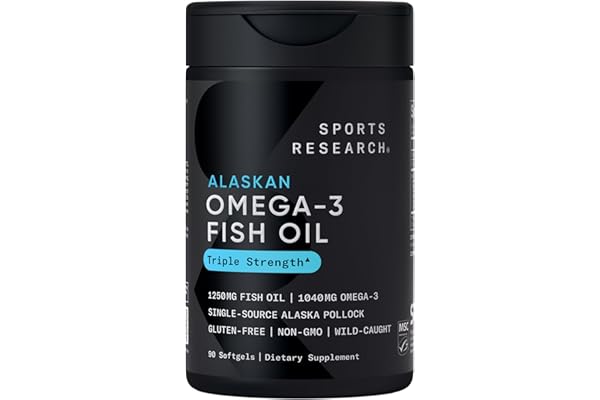
Sports Research Triple Strength Omega 3 Fish Oil – Burpless Fish Oil Supplement w/EPA & DHA Fatty Acids from Single-Source Wild Alaskan Pollock – 1250 mg, 90 ct
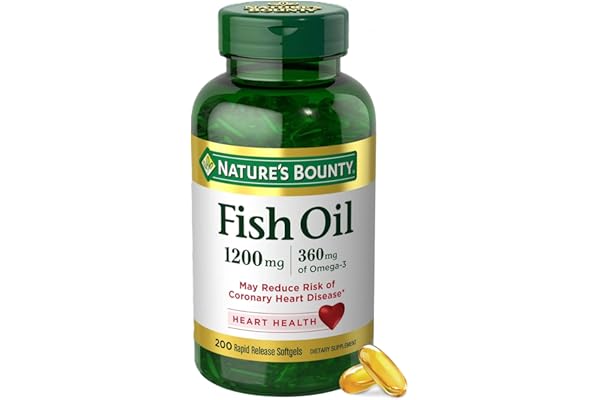
Nature’s Bounty Fish Oil Omega 3 Supplements – Supports Heart Health, 1200 Mg Fish Oil, Omega-3, 200 Softgels (Pack of 1)
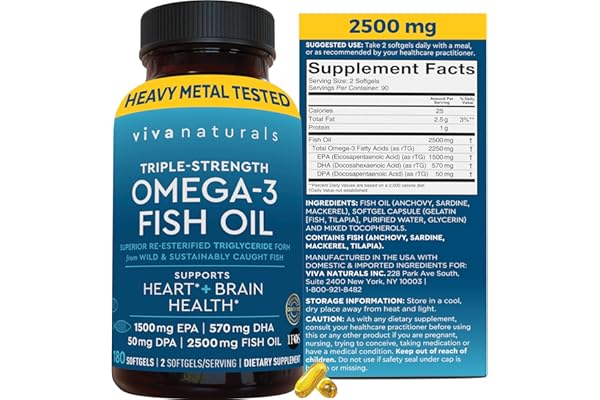
Triple Strength Omega 3 Fish Oil Supplement for Men and Women – 2500 mg High-Potency, Easy-to-Absorb Re-esterified Triglyceride Form, Pescatarian-Friendly DPA EPA DHA Omega 3 Supplement, 180 Softgels
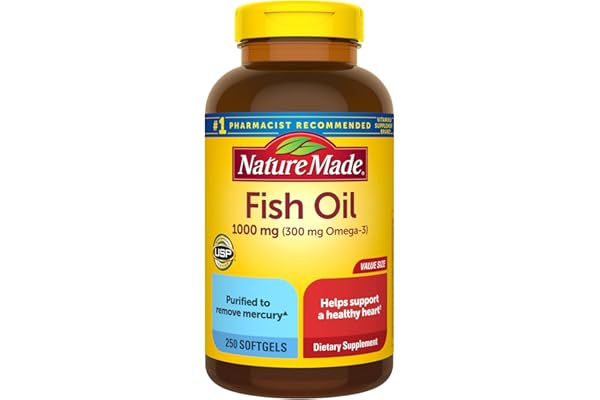
Nature Made Fish Oil Omega 3 Supplements, 1000mg Softgels, Omega 3 Fish Oil for Healthy Heart Support, 250 Softgels, 125 Day Supply
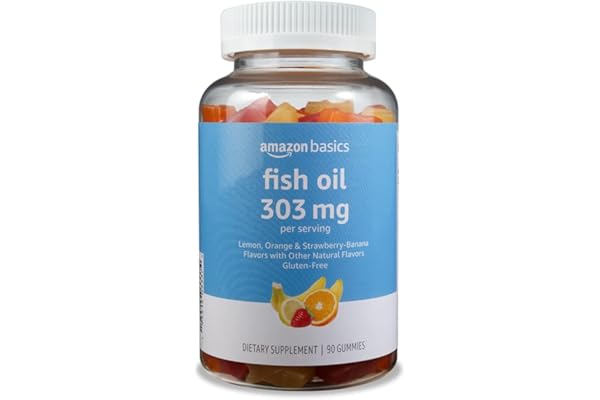
Amazon Basics Fish Oil 303 mg, Lemon, Orange & Strawberry-Banana flavors, 90 Gummies (2 per Serving), EPA and DHA Omega-3 fatty acids (Previously Solimo)
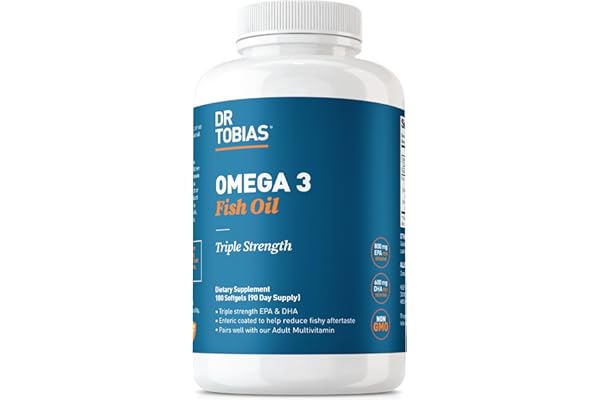
Dr. Tobias Omega 3 Fish Oil, 2000mg Triple Strength with 800mg EPA 600mg DHA Per Serving, Fish Oil Omega 3 Supplements for Heart, Brain & Immune Support, 180 Softgels, 90 Servings
Related:
Fish Oil Prevents Heart Disease
Pan Fried Fish with Spicy Pineapple Salsa Recipe


